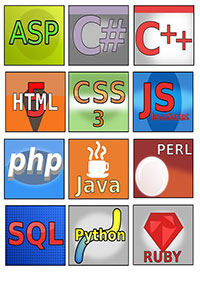Top 4 Programming Languages to Master: For an Effective Web Development
Even picturing yourself as a seasoned web developer will be a sin if you do not fit into that role. Whether it is writing a markup or coding, one should be proficient enough to call themselves as such.
From a simple static website to rich dynamic web applications, the degree of finesse required to achieve Excellency in very huge. The factors may vary for every web development project, and it will be through server platform, server software, database, and finally the budget.
An Introduction to Web Development
Web development deals with building websites without much insight on the design aspects. Basically, the process of Web development revolves around three major stages: client-side scripting, server-side scripting, and database technology.
If you wish to play in this arena, you can be either a front-end developer, back-end developer or a full stack developer. One can find a good number of web development software but to deal with them, an expert insight on various programming languages is required.
Most In-Demand Programming Languages for Web Development
Where to begin? Well, the time here now is not to panic but to learn with passion and commitment. So what in the world is a programming language?
In simple words, if you want a computer to perform something of your wish, then you communicate with them through a certain dialect, which is nothing but a programming language.
A good web developer is one who chooses a programming language based on the project size. Not only that, but there are various other factors that should be given an equal importance as well. Following are few popular programming languages that one should be aware of.
- Java
- (WORA) Write once, run anywhere, well if this concept rings a bell then you should know that the origin is through Java. Basically, any program’s source code written high-level programming language is converted to a low-level programming language (machine language) through a compiler. This is performed to make the code executable on multiple platforms.
- The beauty of Java is you get adequate runtime support for multiple platforms without any compilation to machine language; instead through an intermediate form (Java bytecode). A class-based, object-oriented language, Java is built to offer portability.
- Conventionally used as a server-side language for back-end development, Java is being used by millions of developers around the world.
- C
- A general-purpose, imperative programming language, C is one of the oldest you can find and a predecessor to C++. A strong knowledge of C implies that you created a strong foundation to learn other programming languages. With very few changes to its source code, C welcomes cross-platform programming.
- Basically developed for UNIX OS, the C language should be compiled to be used on different architectures and OS.
- C++
- Again another general-purpose programming language, C++ is multi-paradigm and hence offers generic, imperative, and object-oriented programming features.
- Based on C, C++ is also known as a mid-level programming language as it offers the features of both high and low-level programming languages. With rich function libraries; C++ is still a language of choice for web and application developers.
- C# or C Sharp
- A multi-paradigm programming language, C# has a rich class of libraries and comes with an automatic garbage collection feature to support smooth code execution. The features of C# are accessible through .NET framework.
- C Sharp or C# extensively supports Structures, Operator Overloading, and Preprocessors directives. And a good thing about C# is you do not have to worry about header files, as they increase the dependencies for the source file.
The list does not stop here and completes only when it includes JavaScript, Python, PHP, and Ruby. Even though each of these programming languages has a large community, as an individual language they are not efficient for every unique developmental task.




 +91 8277203000
+91 8277203000
